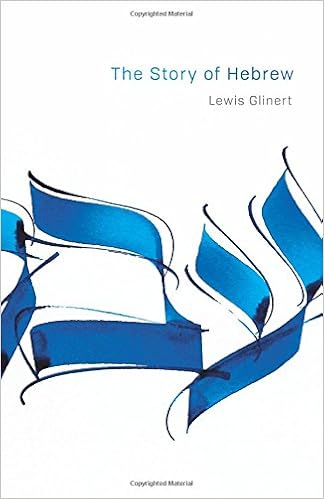
Hebrew (/ˈhiːbruː/; עִבְרִית, Ivrit [ʔivˈʁit] (listen) or [ʕivˈɾit] (
listen)) is a Northwest Semitic language native to Israel, spoken by over 9 million people worldwide.[7][4] Historically, it is regarded as the language of the Israelites and their ancestors, although the language was not referred to by the name Hebrew in the Tanakh.[note 2] The earliest examples of written Paleo-Hebrew date from the 10th century BCE.[9] Hebrew belongs to the West Semitic branch of the Afroasiatic language family. Hebrew is the only living Canaanite language left, and the only truly successful example of a revived dead language. (Wikipedia )
The Story of Hebrew takes readers from the opening verses of Genesis―which seemingly describe the creation of Hebrew itself―to the reincarnation of Hebrew as the everyday language of the Jewish state. Lewis Glinert explains the uses and meanings of Hebrew in ancient Israel and its role as a medium for wisdom and prayer. He describes the early rabbis' preservation of Hebrew following the Babylonian exile, the challenges posed by Arabic, and the prolific use of Hebrew in Diaspora art, spirituality, and science. Glinert looks at the conflicted relationship Christians had with Hebrew from the Renaissance to the Counter-Reformation, the language's fatal rivalry with Yiddish, the dreamers and schemers that made modern Hebrew a reality, and how a lost pre-Holocaust textual ethos is being renewed today by Orthodox Jews.
Lewis Glinert is correct to assert in his The Story of Hebrew that a book like this has not been written since the 1950s. William Chompsky’s Hebrew: The Eternal Language, 1957, is well out of date; A History of the Hebrew Language by Angel Sáenz-Badillos, 1996, is written in a style that leans more toward the expert in the field of linguistics (it is also a translation from Spanish, and the section dealing with modern, or Israeli Hebrew, is positively anemic). In the Beginning: A Short History of the Hebrew Language by Joel Hoffman, 2006, is an accomplished book, but spends just as much time on the theory of language and writing in general as it does on the specifics of Hebrew.
Fact is, it is difficult to write a book about the entire span of a 3000 year language history. But Glinert has done an admirable job. He focuses on particular eras and important individuals to explore how Hebrew began, expanded, slumbered, and was reawakened as a spoken language. There are two chapters on the impact of Hebrew “On the Christian Imagination” and although interesting, I wonder if the author would have best spent precious pages elsewhere, as Christian investigations into Hebrew, by and large, seldom interested Jews, especially in the time period he explores.
With that said, this is a fascinating book, and long in coming. The history of Hebrew is singularly fascinating. An ancient language, it was at once literary (biblical Hebrew), spoken (rabbinical Hebrew) and a language of poetry, letters, and religious study. When it once again became a spoken language in the late nineteenth century, Hebrew entered the world of European nationalism, forming a cohesive bond in a land of immigrants. In the process, it expanded and modernized, developed modern literary forms and informal, spoken modes of speech.
For fans of language study, this book has about all areas of interest; we are lucky to have this work.
No comments:
Post a Comment